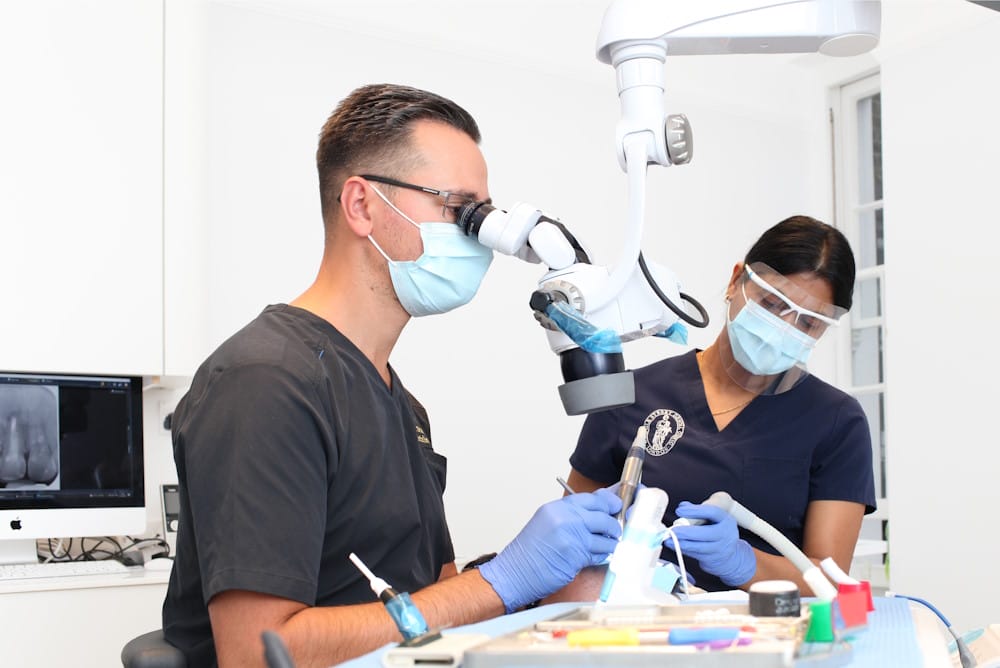Composite bonding in London

Treatment
1-3 hours

Price
From £390

Team Experience
40+ years

Recovery Time
1 day

Google Rating
★★★★★ (4.9)
Examples of our work
Composite bonding is one of the most effective ways to enhance and perfect a smile with minimal invasiveness. At Wimpole Street Dental Clinic, our composite bonding case studies demonstrate how we address a variety of concerns, from closing gaps and reshaping teeth to correcting chips and discoloration. Each case reveals a patient’s transformation journey, showcasing our personalized approach and attention to detail that leads to natural-looking, beautiful results.
What is composite bonding?
Composite bonding (sometimes called cosmetic teeth bonding or dental bonding) is a cosmetic dentistry treatment where a tooth-coloured composite resin is applied to the surface of the teeth. This resin is sculpted, shaped, and polished to repair imperfections and create a flawless finish.
Composite bonding can be used for:
- Closing gaps between teeth.
- Repairing chips, cracks, or worn edges.
- Correcting minor misalignments.
- Improving discolouration or staining.
- Reshaping uneven or short teeth.
For subtle improvements at the edges of teeth, the treatment is known as edge bonding. When applied across the full front surface of a tooth, it is often referred to as a composite veneer. Both approaches can be customised as part of your personal treatment plan.
Benefits of composite bonding
Composite bonding is one of the most versatile treatments in cosmetic dentistry. Patients choose this treatment because it offers:
- Minimally invasive care – no removal of natural tooth structure.
- Immediate results – a brighter, more even smile in just one appointment.
- Affordability – composite bonding price is lower than porcelain veneers or crowns.
- Reversibility – the composite can be removed or replaced in the future.
- Customisation – colour-matched to blend perfectly with surrounding teeth.
- Durability – results last 10–15 years with proper care.
- Confidence boost – a natural-looking smile that enhances both appearance and self-esteem.
Composite bonding aftercare
Looking after your bonded teeth is simple and ensures long-lasting results:
- Oral hygiene – brush twice daily with a non-abrasive fluoride toothpaste and floss daily.
- Avoid staining – limit coffee, tea, red wine, and tobacco to prevent discolouration.
- Protect your teeth – don’t bite nails, chew pens, or use teeth as tools.
- Night guard – if you grind your teeth, wearing a guard will extend the life of your bonding.
- Regular check-ups – attend routine dental visits and yearly polish appointments to keep your bonding in top condition.
With proper composite bonding aftercare, results typically last between 10 and 15 years.
Composite bonding vs veneers vs crowns in Cosmetic Dentistry
Patients often ask how composite bonding compares with other cosmetic dentistry treatments:
| Treatment | Composite bonding | Porcelain veneers | Crowns |
|---|---|---|---|
| Invasiveness | Non-invasive, no enamel removal | Requires enamel removal | Requires more tooth preparation |
| Cost | More affordable | Higher cost | Higher cost |
| Durability | 10–15 years | 20–25 years | 20–25 years |
| Treatment time | One visit | 2–3 visits | 2–3 visits |
| Reversibility | Yes | No | No |
Composite bonding is the ideal choice for patients who want quick, affordable, and reversible results without committing to more invasive procedures.
Composite Bonding Procedure
At Wimpole Street Dental Clinic, we ensure that your composite bonding procedure is smooth, comfortable, and achieves the best possible results. Here’s a step-by-step guide to what you can expect during your composite bonding treatment:
1. Consultation and planning
Your journey begins with a consultation with one of our experienced dentists. We’ll discuss your smile goals, examine your teeth, and confirm if composite bonding is the right solution. Using digital smile design and photography, we can mock up the expected results so you feel confident in your choice before treatment begins.
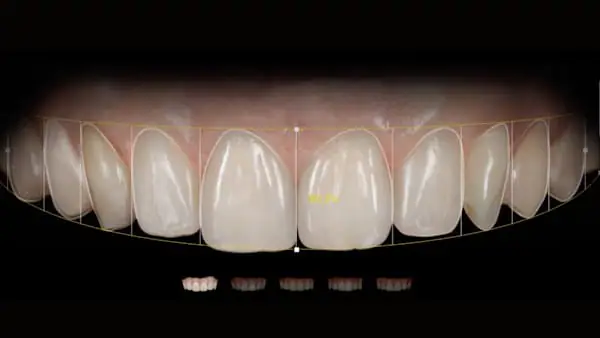
2. Teeth whitening (optional)
Many patients choose to undergo teeth whitening a few weeks before bonding. This ensures your bonded teeth are colour-matched to a brighter overall shade for a whiter smile.
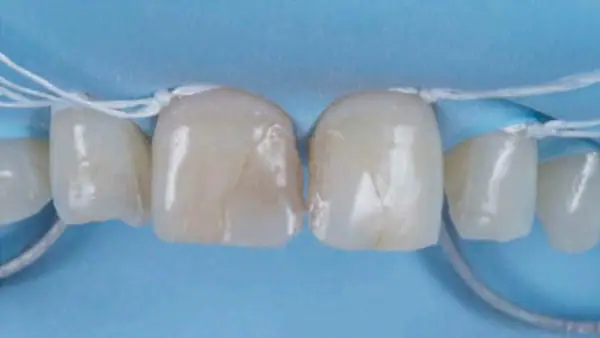
3. Preparation
With the end result in sight, the dentist will clean and isolate your teeth prior to the application of the composite. We use the latest generation of airflow and sandblasting to create an immaculate surface. This will have a determinant impact on the longevity of the composite bonding.
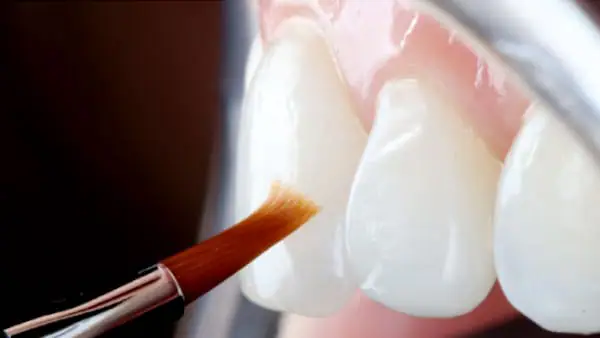
4. Application
The tooth surface is lightly etched to create texture. A conditioning liquid is then applied, preparing the surface for the composite resin.
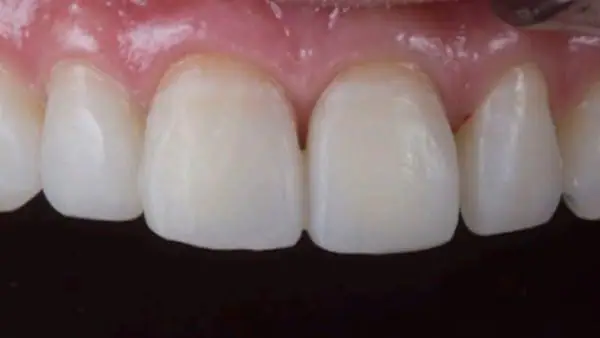
5. Bonding and sculpting
A tooth-coloured resin is placed onto the tooth in layers. Our dentist carefully sculpts it into the desired shape, correcting imperfections and enhancing your smile’s symmetry. After the composite resin has hardened, the dentist will further trim, shape, and polish it to match the sheen of the rest of your tooth. This step ensures that the bonded tooth looks natural and blends seamlessly with your surrounding teeth.
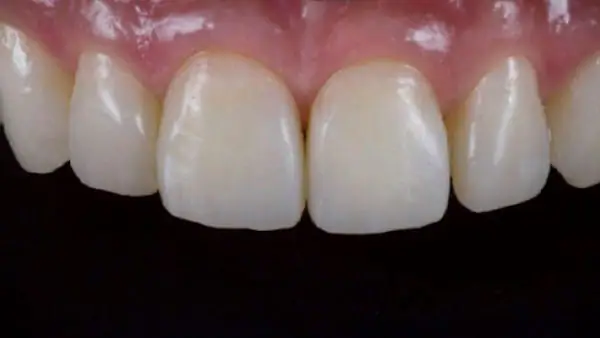
Final adjustments
Your dentist will make any final adjustments to ensure your bite feels comfortable and the appearance meets your expectations. The entire process typically takes about 30 to 60 minutes per tooth.
Meet your award-winning Composite Bonding dentist and team…
Choosing Wimpole Street Dental Clinic means placing your smile in the care of some of London’s most respected dental professionals. Our composite bonding experts bring together over 75 years of combined experience, having successfully performed more than 10,000 treatments with consistently high patient satisfaction. Recognised as leaders in the field, our clinicians lecture internationally and contribute to scientific research in cosmetic dentistry, staying at the forefront of innovation and best practice. You’ll find us in the heart of Marylebone, in a fully refurbished, state-of-the-art clinic designed to deliver the highest standard of care.
Why do some many dentists recommend a composite bonding procedure to improve your smile?
Choosing Wimpole Street Dental Clinic means opting for a dental care experience marked by expertise, state-of-the-art facilities, comprehensive care, and a patient-first philosophy. We invite you to join our family of satisfied patients and experience the exceptional dental care we are known for.
Another significant benefit of composite bonding is its non-invasive nature. composite bonding requires little to no removal of the natural tooth structure.
The time frame of the composite bonding process is also notable. The procedure is relatively quick, often completed in a single visit. Typically, it takes about 30 to 60 minutes per tooth, depending on the complexity of the case.
Cost-effectiveness is another appealing aspect of composite bonding. Compared to other cosmetic dental procedures like veneers or crowns, composite bonding is generally more affordable. This makes it an accessible option for many patients who wish to improve their smile without incurring high costs.
Composite bonding is also highly versatile, addressing a range of dental issues such as wear, chips, cracks, discolouration, gaps, and minor misalignments. This versatility makes it a comprehensive solution for patients with multiple aesthetic concerns, allowing them to achieve a cohesive and improved appearance.
Durability is an essential benefit of composite bonding. With proper care, the results can last for several years. The materials used in the procedure are robust and durable, capable of withstanding the regular wear and tear from daily activities such as eating and speaking. Maintaining good oral hygiene and regular dental check-ups can further extend the lifespan of composite bonding.
Improving one’s smile through composite bonding can also significantly boost confidence. A radiant, flawless smile can enhance self-esteem and overall quality of life, making social and professional interactions more enjoyable and fulfilling. The increased confidence that comes with a beautiful smile is often one of the most rewarding aspects for patients who choose this treatment.
Crucially, composite bonding is a potentially reversible procedure. The composite can be adjusted or removed if desired in the future, offering flexibility for patients who may want changes down the line.



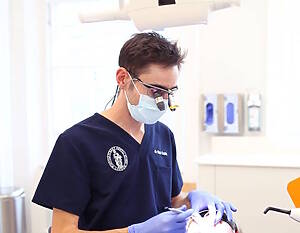


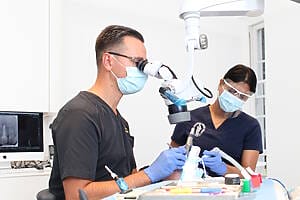



Looking for the best Composite Bonding in London?
At Wimpole Street Dental Clinic, expertise is not just a claim – it’s the foundation of everything we do. Our team is composed of some of the most highly regarded clinicians in London, each bringing advanced training, years of hands-on experience, and a passion for delivering exceptional outcomes.
Many of our dentists hold international qualifications and are actively involved in teaching, publishing, and speaking at leading dental conferences. This ensures that our clinical approach is not only grounded in proven science but also informed by the latest developments in cosmetic and restorative dentistry.
Every treatment is delivered with meticulous attention to detail, combining technical skill with artistic precision to achieve natural, confident results. Whether you’re coming to us for a subtle improvement or a full smile transformation, you can trust that your care is in the hands of professionals who are truly at the top of their field.
Composite Bonding FAQs
Composite bonding is a cosmetic dental treatment where a tooth-coloured resin is applied to teeth to correct imperfections. The resin is sculpted directly onto the tooth surface, hardened with a curing light, and polished to look completely natural. It can be used to fix chips, cracks, gaps, uneven lengths, and even mild misalignments. Because it’s non-invasive, no enamel is removed, meaning your natural teeth remain intact. Many patients choose bonding over other forms of cosmetic dentistry, such as veneers, because it is quick, affordable, and reversible. It’s sometimes called cosmetic teeth bonding or dental bonding.
With the right care, composite bonding typically lasts 10–15 years. Factors such as your bite, oral hygiene routine, and lifestyle habits influence durability. For example, front teeth may need touch-ups sooner due to daily wear and tear. Patients who grind their teeth (bruxism) may need to wear a protective night guard to prevent premature wear. Regular dental check-ups and professional polishing will keep your bonding looking fresh. While porcelain veneers can last longer, composite bonding offers a more affordable and flexible option. If maintained properly, many patients enjoy long-lasting results without needing major touch-ups.
No — composite bonding is a completely painless treatment. Because the procedure involves adding material rather than removing tooth structure, there’s no need for drilling or injections in most cases. Patients often describe it as comfortable and stress-free, similar to having a filling or polish. The resin is applied in thin layers and shaped carefully, then set using a curing light. Afterwards, you can resume normal activities straight away. For anxious patients, our team also provides additional comfort measures to ensure the experience is relaxing.
The time depends on how many teeth are treated and the complexity of the work. On average, it takes around 30–60 minutes per tooth. Treating a single chipped tooth might be completed in under an hour, while a full smile makeover with multiple teeth can take 2–3 hours. The key advantage of bonding is that it’s usually completed in a single visit, so you leave the clinic the same day with a transformed smile. Unlike veneers or crowns, there’s no need for temporary restorations or laboratory turnaround.
Caring for bonded teeth is very similar to looking after natural teeth, with a few extra precautions. Brush twice daily with a fluoride toothpaste and floss once a day to maintain gum health and prevent staining. Avoid abrasive whitening toothpastes that can scratch the resin surface. Limit foods and drinks that cause staining, such as coffee, tea, red wine, and tobacco. If you grind your teeth, a custom night guard will protect the bonding. Regular dental check-ups are essential, as your dentist can polish the bonding once a year to keep it smooth and shiny. With these steps, you can maintain both the appearance and integrity of your bonding for years.
Yes — one of the benefits of composite bonding is that it’s reversible and adjustable. The composite resin can be removed, reshaped, or replaced without damaging the natural enamel underneath. This flexibility means you can make adjustments if your smile goals change in the future, or if you want to upgrade to veneers or crowns later on. Removal must be done carefully by an experienced dentist, as the process requires precision to avoid affecting the enamel. Many patients appreciate this reversibility, as it offers peace of mind compared to more permanent treatments.
Composite bonding is suitable for most people looking to improve their smile, especially those with minor imperfections such as chips, cracks, discolouration, small gaps, or uneven teeth. However, it may not be the best option for patients with significant tooth decay, gum disease, severe misalignment, or heavily damaged teeth. In these cases, veneers, crowns, or orthodontics may provide a better solution. A consultation with our composite bonding experts will confirm suitability and create a tailored treatment plan. For many patients, bonding is the quickest, most affordable route to a brighter smile.
While composite bonding offers many advantages, there are some considerations:
It is not as long-lasting as porcelain veneers or crowns.
The resin is more prone to staining, especially if you frequently consume coffee, red wine, or tobacco.
Bonded teeth can chip if exposed to habits like nail-biting, chewing pens, or opening packets with your teeth.
Maintenance is required: occasional polishing and potential replacement after 5–10 years.
Despite these points, composite bonding remains one of the most popular cosmetic dentistry options due to its affordability, speed, and natural-looking results. For many patients, the benefits far outweigh the limitations.
At Wimpole Street Dental Clinic, composite bonding price starts from £390 per tooth. The total cost varies depending on the number of teeth treated and the complexity of the work. Compared to porcelain veneers (which can cost over £1,000 per tooth), bonding is a more affordable option, while still achieving dramatic improvements. During your consultation, we’ll provide a personalised quote and discuss financing options to make your treatment more accessible. Considering its durability and cosmetic impact, composite bonding offers excellent value within cosmetic dentistry.
Content updated
Written by: Dr Raul Costa
Medically reviewed by: Prof Dr Christian Mehl
Hero banner updated
Written by: Prof Dr Christian Mehl
Medically reviewed by: Dr Raul Costa
New page design
Written by: Prof Dr Christian Mehl
Medically reviewed by: Dr Raul Costa
Wimpole St Dental Clinic has strict sourcing guidelines and relies on peer-reviewed studies, academic research institutions, and medical associations. We avoid using tertiary references. You can learn more about how we ensure our content is accurate and current by reading our editorial policy.










